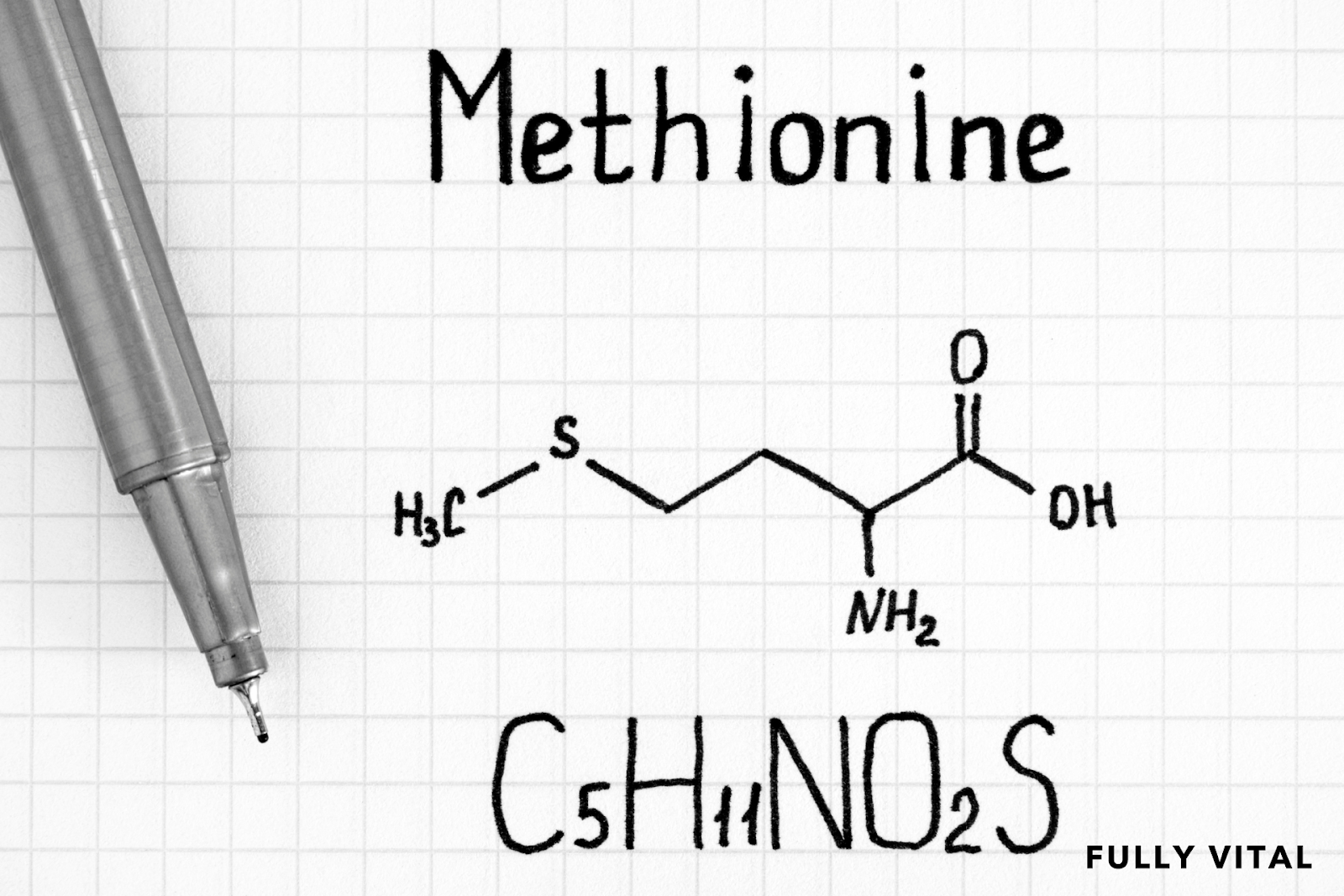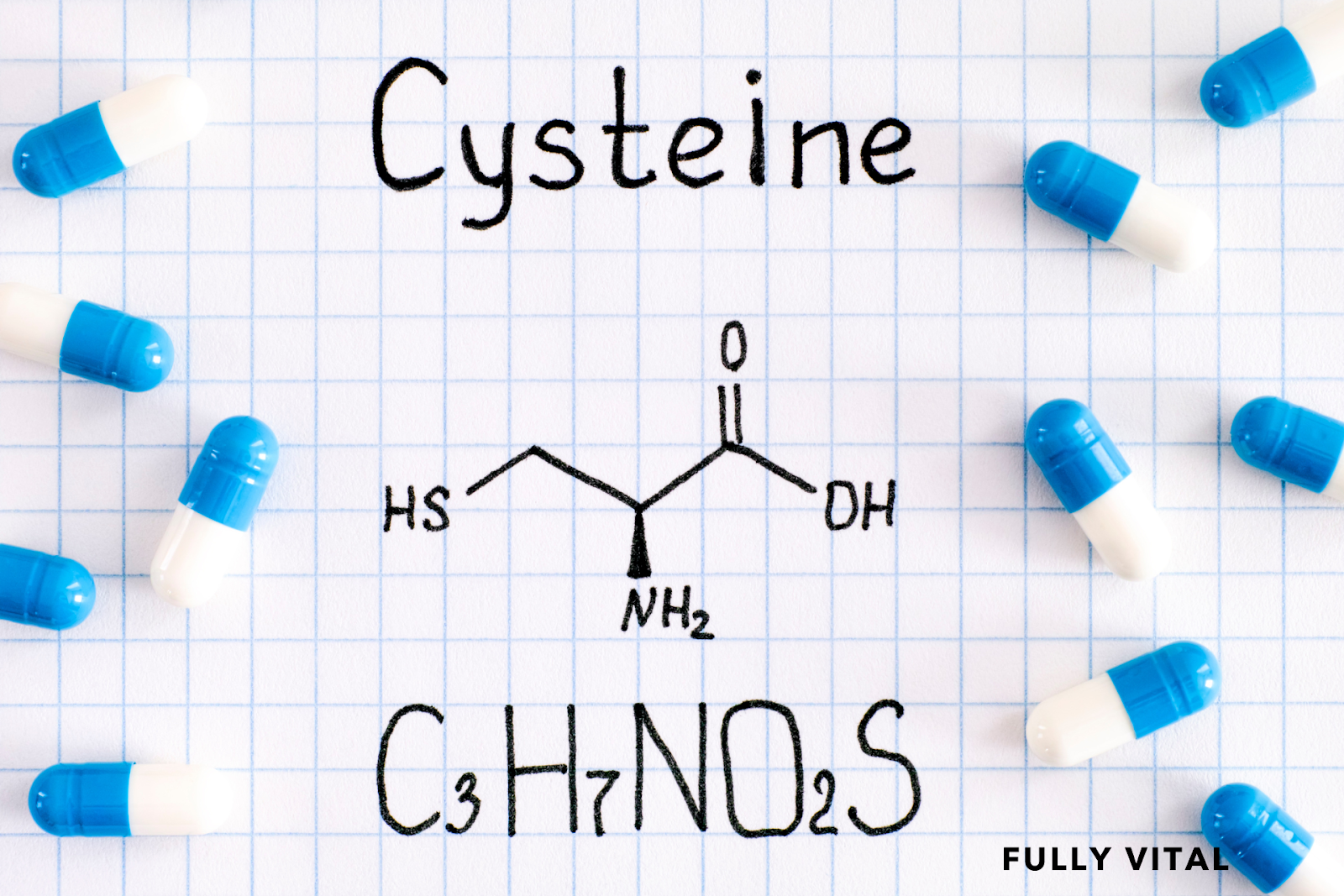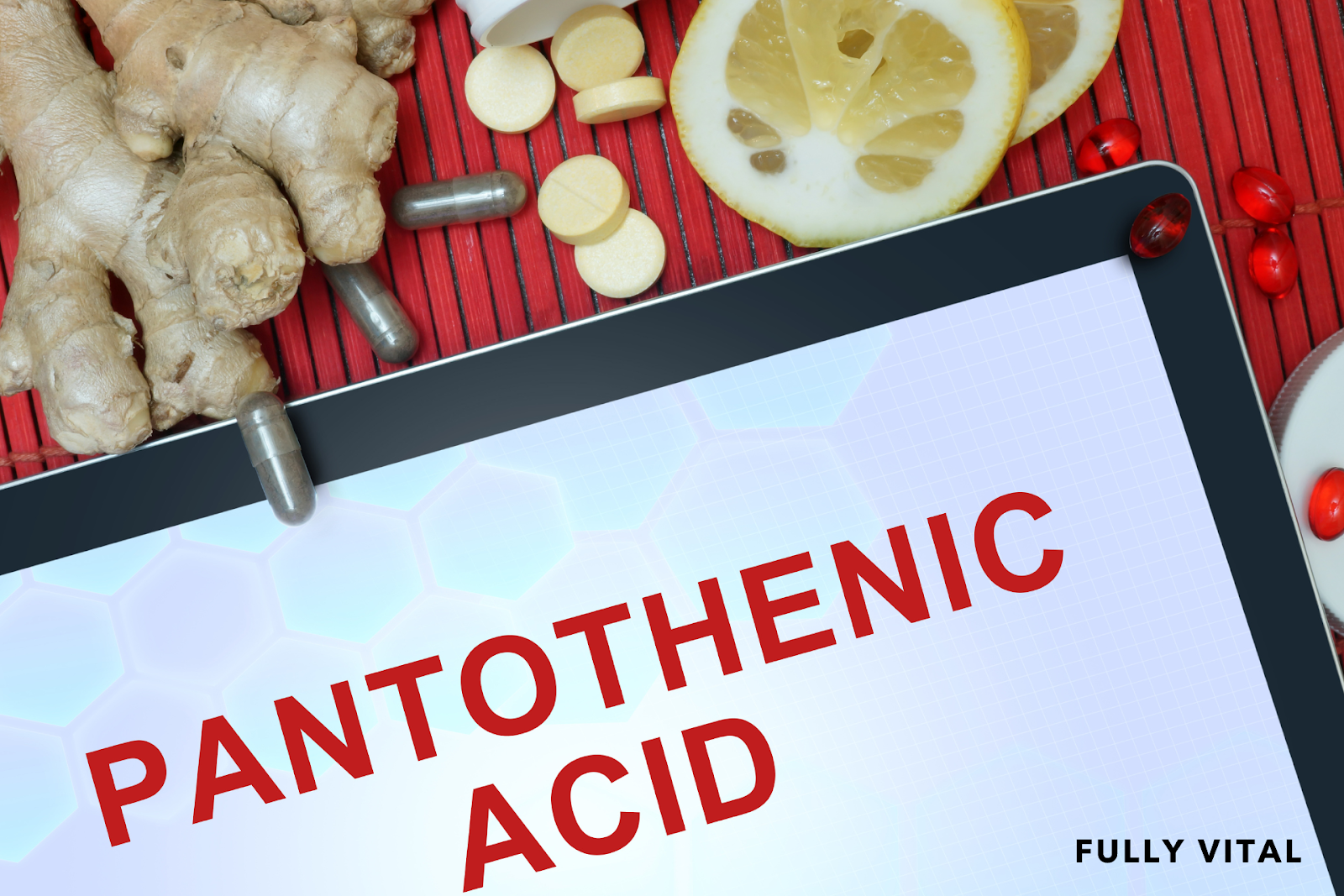
Methionine: A Sulfur Source for Hair Success
Nuanced and often overlooked, methionine is an amino acid that makes a significant difference in the quest for healthy hair.
The connection between methionine and hair health is rooted in its role as a sulfur donor, crucial for robust hair strands.
This article will guide you through the various facets of methionine, from its fundamental functions in the body to its vital contributions to hair vitality.
We're here to dissect the scientific and nutritional aspects that turn this amino acid into a key ingredient for your hair care routine.
Ready to jump into the details?
Let's proceed with the content of methionine and unveil its importance in the language of hair wellness.

I LOVE MY HAIR NOW
FullyVital hair serum and hair vitamins made tremendous improvements in my hair. I truly love my hair now.
Shop Hair ProductsWhat Is Methionine and Its Role in the Body?
Methionine is classified as an essential amino acid, which means your body cannot produce it on its own—intake through diet is necessary.
In terms of its functions, methionine plays a critical role in starting protein synthesis and is involved in several metabolic processes.
It's integral to the growth of new blood vessels and muscle health, proving it's not just beneficial for hair but essential for overall wellness.
Understanding the Significance of Methionine and Sulfur for Hair Health
The link between methionine and sulfur is particularly significant for hair health.
Sulfur is a component of keratin, the protein that largely constitutes our hair, skin, and nails.
By supplying sulfur, methionine aids in the production and protection of keratin, thus supporting the infrastructure of healthy hair from within.1
That's the short of it—methionine is vital, and we need to get it through our diet to help our hair and body thrive.
How Does Methionine Benefit Hair Health?
Methionine in Keratin Production
Methionine's primary claim to fame in hair health is its role in producing keratin, the protein that acts as the main structural component of hair.
It supplies the sulfur necessary for the keratin to maintain its strength, structure, and resilience.
By contributing to the keratin matrix, methionine helps to enhance the integrity of hair fibers, leading to a decrease in breakage and a boost in the overall health of your locks.
Supporting Hair Growth and Repair
Not only does methionine assist in building hair's structure, but it also gets involved in regulating hair growth and the repair of damaged cells.
It's a precursor to cysteine, another sulfur-containing amino acid that can directly influence the hair growth cycle.
Additionally, methionine has been suggested to stimulate hair follicles and extend the growth phase, which can lead to longer, fuller hair over time.
Antioxidant Effects on Hair
Let's not forget methionine's antioxidant properties.
Oxidative stress can wreak havoc on the scalp and hair.
Methionine works to combat this by neutralizing the damage caused by free radicals—unstable molecules that can affect healthy cells.
This means healthier scalp conditions, potential prevention of premature graying, and limiting environmental damage to your hair.2

What Happens When You Have Methionine Deficiency?
Identifying Methionine Deficiency and Its Impact
A shortage of methionine might not be common, but when it does occur, the signs can be subtle and often intertwined with symptoms of broader dietary deficiencies.
Since methionine is vital for the synthesis of proteins and other amino acids, its deficiency can lead to symptoms like hair weakness, slow growth, or even hair loss.
Remember, your hair reflects your overall health, and insufficient methionine can suggest you're not getting the full range of essential amino acids.
Managing Deficiency for Hair Vitality
If you suspect a methionine deficiency is affecting your hair, it's essential to assess and adjust your diet.
Foods like eggs, nuts, seeds, and soy products are rich in methionine.
For those unable to meet their methionine quota with diet alone, supplements might be an option—though they should only be considered after consulting with a healthcare provider.
Getting methionine back on track could pave the way toward reviving your hair's health.
Where Can You Find Natural Sources of Methionine?
Dietary Sources of Methionine
Navigating the grocery aisles with hair health in mind means keeping an eye out for methionine-rich foods.
Animal proteins, like meat, fish, and dairy, are particularly high in methionine.
For those on a plant-based diet, fear not—options abound.
Beans, lentils, and whole grains also contain this vital amino acid; however, they may not provide it in as high quantities as animal sources.
It's all about balance and ensuring your intake of methionine aligns with your dietary patterns.
Leveraging Diet for Hair Health
Incorporating varied sources of methionine through your diet is not just good for hair, but also supports overall health.
It's worth noting that while focusing on methionine intake is useful, an overall balanced diet rich in a variety of nutrients is crucial for optimal hair health.
Beyond hitting the mark on methionine, make sure to consume a well-rounded mix of vitamins, minerals, and other amino acids to keep your hair at its best.
What Are the Recommended Intake and Potential Side Effects of Methionine?
Navigating Methionine Dosage
Methionine is fundamental, but like many nutrients, there's a balance to be struck.
While there is no universally agreed-upon daily recommended amount, it's included in the larger category of required daily protein.
General guidelines suggest that adult men and women should aim for an overall protein intake that provides sufficient methionine within a balanced diet.
An overdose of methionine is rare when it comes from food sources, but it's still important to operate within the constraints of a varied diet.
Understanding Potential Side Effects
When it comes to supplements, the stakes change.
High doses of methionine supplements can potentially lead to unwanted side effects, such as an increased risk of heart disease or elevated levels of homocysteine, an amino acid linked with vascular issues.
For safety and effectiveness, it's always best to consult a healthcare provider before starting any supplement regimen, ensuring methionine intake is appropriate for your individual health needs.
What Does Science Say About Methionine and Hair Health?
Research Findings on Methionine and Hair
The scientific community has taken note of methionine’s impact on hair health, and various studies have shed light on its importance.
Clinical research has indicated that methionine can promote hair strength and minimize breakage by replenishing the sulfur required for keratin integrity.
Experimental models also suggest that methionine supplementation might contribute to a longer anagen phase—the active growth phase of hair follicles—potentially leading to enhanced hair growth.3
Critically Evaluating the Evidence
While the research appears promising, it's crucial to critically evaluate the evidence.
Scientific studies can vary in their methods and results can differ based on numerous factors.
It is important for consumers to comprehend that no single study can provide all the answers, and the existing body of research should be considered collectively.
Nonetheless, the prevailing scientific discourse does support methionine as beneficial for hair health when included as part of a balanced diet.
How Can Methionine Be Integrated into Your Hair Care Routine?
Incorporating Methionine into Hair Care Practices
To harness the benefits of methionine for your hair, consider incorporating it consciously into your routine.
Start by analyzing your diet and identify if you're consuming enough methionine-rich foods.
This could mean adjusting your intake of lean meats, eggs, and dairy or focusing on plant-based sources like beans and seeds if you're vegetarian or vegan.
For some, especially those with higher needs or restrictions, methionine supplementation might be a route to explore under professional guidance.
A Holistic Approach to Hair Wellness
Remember, a single nutrient alone will not solve all hair health issues.
Methionine works best as part of a holistic approach to wellness that includes a balanced diet, adequate hydration, stress management, and proper hair care techniques.
Ensuring you get a wide range of vitamins and minerals will not only benefit your hair but overall health, too.
By incorporating methionine effectively into your daily life, you're taking a proactive step towards lustrous, strong hair as part of a healthy lifestyle.

Discover the Distinction with Fully VitalFed up with the challenges of thinning and aging hair? We're here to provide assistance. At Fully Vital, we are dedicated to the well-being of your hair. Our scientifically-driven hair growth solutions address aging from the inside out, going beyond surface-level treatments. Effortless and Swift: Allocate just 2 minutes daily to integrate our system into your hair care routine, ensuring convenience even for the most hectic lifestyles. Vegan-Friendly: We champion the potency of nature without compromising your principles. Our Vegan Hair Regrowth System is meticulously crafted with plant-based ingredients, ensuring ethical and sustainable choices. Trustworthy Results: We stand by the effectiveness of our product. Experience the transformation with confidence, supported by our 120-day money-back guarantee. Commence your journey to healthier hair with a simple click. Unlock sumptuous, voluminous locks. At Fully Vital, it goes beyond mere hair growth; it's about elevating your confidence and vitality. Trust in science, trust in Fully Vital! |
Final Thoughts On Methionine
Methionine's role in hair health is multi-faceted and significant.
As a sulfur-donating essential amino acid, it underpins the structural strength of hair through keratin production, aids in hair growth and repair, and offers antioxidant protection against environmental stressors.
Recognizing its importance is the first step in harnessing its potential to improve hair health.
Whether through dietary adjustments or, when necessary, supplementation, ensuring an adequate intake of methionine could be a powerful ally in your hair care regimen.
Ultimately, while methionine plays a niche yet crucial role, it's essential to remember that hair vitality thrives on a collective approach.
A well-rounded diet, consistent care practices, and an understanding of personal health needs form the pillars of not just hair wellness but holistic self-care.
With this knowledge in hand, you're well-equipped to make methionine a part of your journey towards fuller, healthier hair.
Check out our recent blogs:
- Understanding Anthralin: A Key Ingredient For Hair Growth
- Catagen Phase: Understanding The Hair Growth Cycle
- Hair Straightening: Everything You Need To Know
Frequently Asked Questions About Methionine
Does methionine improve the texture of hair?
Methionine contributes to the structural integrity of hair by aiding in keratin production, which can improve the texture by making it smoother and less prone to breakage.
Can increasing methionine intake prevent graying hair?
While there's no conclusive evidence that methionine prevents graying, its role as an antioxidant may help reduce oxidative stress, a factor implicated in premature graying.
Is methionine beneficial for scalp health?
Yes, methionine's antioxidant properties can contribute to a healthier scalp environment, which is essential for hair growth and health.
Should I take methionine supplements for better hair?
Supplements should be considered only if you’re unable to meet your needs through diet, and it's advisable to consult with a healthcare provider before starting any supplementation.
Can methionine help with hair loss caused by medical conditions?
While methionine is important for hair health, hair loss due to medical conditions should be treated by a healthcare professional.
Methionine may be part of a treatment plan but is not a cure.
Are methionine supplements safe for everyone?
Methionine supplements may not be appropriate for everyone, especially those with certain health conditions.
It's essential to seek medical advice before using supplements.
How long does it take to see the effects of methionine on hair?
The impact of methionine on hair health can vary, and it may take several months of consistent intake to notice changes, as hair growth and repair are gradual processes.
Does cooking affect the methionine content in food?
Cooking can affect amino acid levels in food, but most methionine-rich foods retain their content when cooked using standard methods.
Overcooking, however, may lead to some loss.
Can children or pregnant women benefit from increased methionine?
While methionine is essential for growth and development, individual needs vary, especially in children and pregnant women.
Their intake should be monitored by a healthcare provider.
Do vegetarians and vegans get enough methionine?
Plant-based diets can provide enough methionine, especially when including a variety of protein sources such as legumes, whole grains, nuts, and seeds.
Sources:
- Borowczyk, K., Suliburska, J., & Jakubowski, H. (2018). Demethylation of methionine and keratin damage in human hair. Amino Acids, 50(5), 537–546. https://doi.org/10.1007/s00726-018-2545-3
- Kachungwa Lugata, J., Ortega, A. D. S. V., & Szabó, C. (2022). The Role of Methionine Supplementation on Oxidative Stress and Antioxidant Status of Poultry-A Review. Agriculture, 12(10), 1701. https://doi.org/10.3390/agriculture12101701
- Milani, M., & Colombo, F. (2023). Efficacy and tolerability of an oral supplement containing amino acids, iron, selenium, and marine hydrolyzed collagen in subjects with hair loss (androgenetic alopecia, AGA or FAGA or telogen effluvium). A prospective, randomized, 3‐month, controlled, assessor‐blinded study. 29(6). https://doi.org/10.1111/srt.13381








